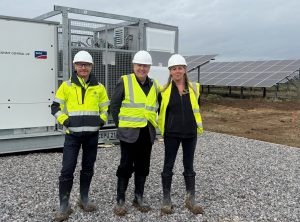Angela Rayner Deputy Prime Minister, The Secretary of State for Housing, Communities and Local Government
With permission, I would like to update the House on devolution in England and local government reorganisation.
The No. 1 mission of this Government is to unlock growth in our regions and put money back in the pockets of working people. Every one of our proud towns and cities has a vital contribution to make to growth, but for all the promises of levelling up, when the rubber hits the road, Governments’ first instincts have been to hoard power and hold our economy back. Since I launched the devolution White Paper in December, I have been overwhelmed by the excitement from communities wanting to join the devolution revolution. With the measures I will announce today, if all goes to plan, over 44 million people will see the benefits of devolution, which is close to 80% of the country. That is more progress in a shorter amount of time than under any Government in Britain’s history.
Today, I am delighted to announce six new potential devolution areas that will be part of our devolution priority programme with a view to mayoral elections in May 2026. These places will get a fast-track ticket to drive real change in their area. While devolution can sound techie, the outcome is simple. It is a plan for putting more money in people’s pockets, a plan for quicker, better, cheaper transport designed with local people in mind, and a plan for putting politics back in the service of working people. Today, I can confirm to Members across the House that the places on the devolution priority programme are: Cumbria; Cheshire and Warrington; Greater Essex; Hampshire and Solent; Norfolk and Suffolk; and Sussex and Brighton. Mr Speaker, a seventh area that is somewhat familiar to both of us, Lancashire, is already deciding its mayoral devolution options, and we will look at its proposals in the autumn in parallel with the priority programme.
When I became Deputy Prime Minister, I promised that this Government would change the future of the north of England so that northerners would no longer be dictated to from Whitehall. The programme I announce today will see the north of England covered by devolution, but this programme is for all of England, as is shown by the significant progress in the east and the south. Today, legislation comes into force creating mayoral devolution in Greater Lincolnshire and in Hull and East Yorkshire, which are electing their first mayors this May, as well as foundational devolution in Lancashire and in Devon and Torbay.
Every place can see a benefit from devolution, and we want to move quickly to realise these benefits within the first term of our Government. Whether it is more regular bus services, more affordable housing or the simple fact that local people will have a local champion with regional influence, mayors have a proven track record of delivering growth and higher living standards. But we are clear that where a mayor is not using their powers to benefit their residents, the Government will have the tools to ensure delivery. We will create strong accountability measures in the English devolution Bill to ensure that mayors deliver the housing, transport and infrastructure that their residents need.
But devolution is only as strong as the foundations it is built on. Despite the funding injection from this Government, councils of all political stripes are in crisis. A decade of cuts and sticky-plaster politics has left councils in a 14-year doom loop. That is why we are fixing the foundations of local government by reforming funding and focusing on prevention. I know how vital local government is for achieving our Government missions. I also know that reforming local government means tough choices—choices that the Conservatives were simply too unwilling to take.
Councillors of all types, including district councillors, tell me that the two-tier system is not working, so alongside our wider reforms, this Government are committed to making simpler, more efficient and clearer structures so that residents can access good public services without eye-watering price tags. These kinds of reforms will not happen overnight, but we are determined to deliver fairer funding to end the postcode lottery so that everyone gets the support from public services that they deserve. That is why today I will be issuing a legal invitation to all 21 two-tier areas to submit proposals for new unitary councils. Letters and the accompanying written statement will set out the requirements for these proposals.
New unitary structures will be the right size to achieve efficiencies, improve capacity and withstand financial shocks, but I am clear about the need for flexibility when reorganisation goes hand in hand with mayoral devolution and when it is coupled with ambitious plans for housing growth, so these proposals will be developed with effective local engagement and dovetail with devolution arrangements. I want to reassure Members that this process will involve extensive engagement with local communities and Members of this House.
Turning to the timings of the local elections in May, for certain areas a significant amount of work is needed to unlock devolution and deliver reorganisation. For this reason, some areas requested to postpone their elections until May 2026. The Government’s starting point is for all elections to go ahead unless there is a strong justification for postponement. The bar is high, and rightly so. I am agreeing to only half of the requests that were made. After careful consideration, I have agreed to postpone elections only in places where this is central to our manifesto promise to deliver devolution.
We are not in the business of holding elections to bodies that will not exist, and where we do not know what will replace them. This would be an expensive and irresponsible waste of taxpayers’ money, and any party calling for those elections to go ahead must explain how this waste would be justifiable. To that end, I have agreed to postpone local elections in East Sussex and West Sussex, in Essex and Thurrock, in Hampshire and the Isle of Wight, and in Norfolk and Suffolk. I have also agreed to a postponement in Surrey, given the urgency of creating sustainable new unitary structures, to unlock devolution for this area. I intend to move to elections to the new shadow unitary councils in all these areas, as is the usual arrangement for local government reorganisation.
We are postponing elections for one year, from May 2025 to May 2026. There is a well-established precedent, as the Conservative party knows all too well. North Yorkshire, Cumbria, Somerset, Buckinghamshire and Northamptonshire all had their elections rescheduled by the previous Government. I will table the relevant secondary legislation when parliamentary time allows, and local elections will take place as scheduled in all other areas. I make it clear that all two-tier areas should be making plans to move to simpler structures, regardless of election delays. The invitation will be sent to all two-tier areas, with a timetable taking into account that their election has been delayed.
I know that the devolution journey may not always be comfortable for politicians in Whitehall, but it is not supposed to be. After all, we are undergoing a generational power shift from Whitehall to the town hall. We have already seen a huge amount of good will from Labour Secretaries of State who are willing to give up newly won powers for the sake of our towns and cities. The Secretaries of State for Energy Security and Net Zero, for Transport, for Work and Pensions for Science, Innovation and Technology have led the devolution charge, and now the Prime Minister and I ask Members to do the same.
I commend this statement to the House.
John Whittingdale Conservative, Maldon
The Secretary of State is proposing to abolish Maldon district council, which covers my constituency, and absorb it within a local authority that will be based miles away, where Maldon’s councillors will be massively outnumbered by councillors from areas with no connection to the district at all. How does that enhance local decision making?
Angela Rayner Deputy Prime Minister, The Secretary of State for Housing, Communities and Local Government
We are working with local areas using a bottom-up approach to delivering better public services. The right hon. Gentleman’s party pushed local authorities and local government to the brink. He should be apologising, talking to Members on his Front Bench, and getting on board by supporting devolution and local government reorganisation where it delivers for his constituents.
See below to watch a clip of Sir John’s question to the Secretary of State:


